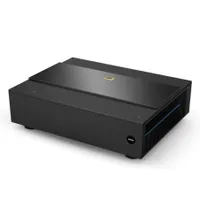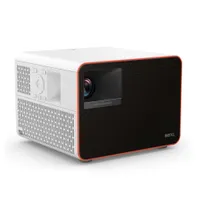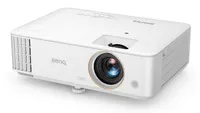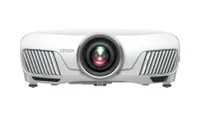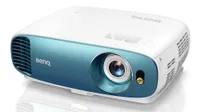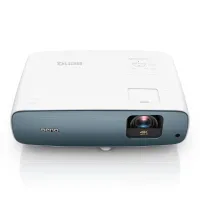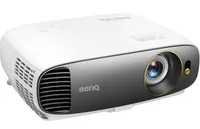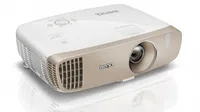Should I buy a BenQ projector? A look at the budget DLP projector brand
Are BenQ projectors worth your consideration?
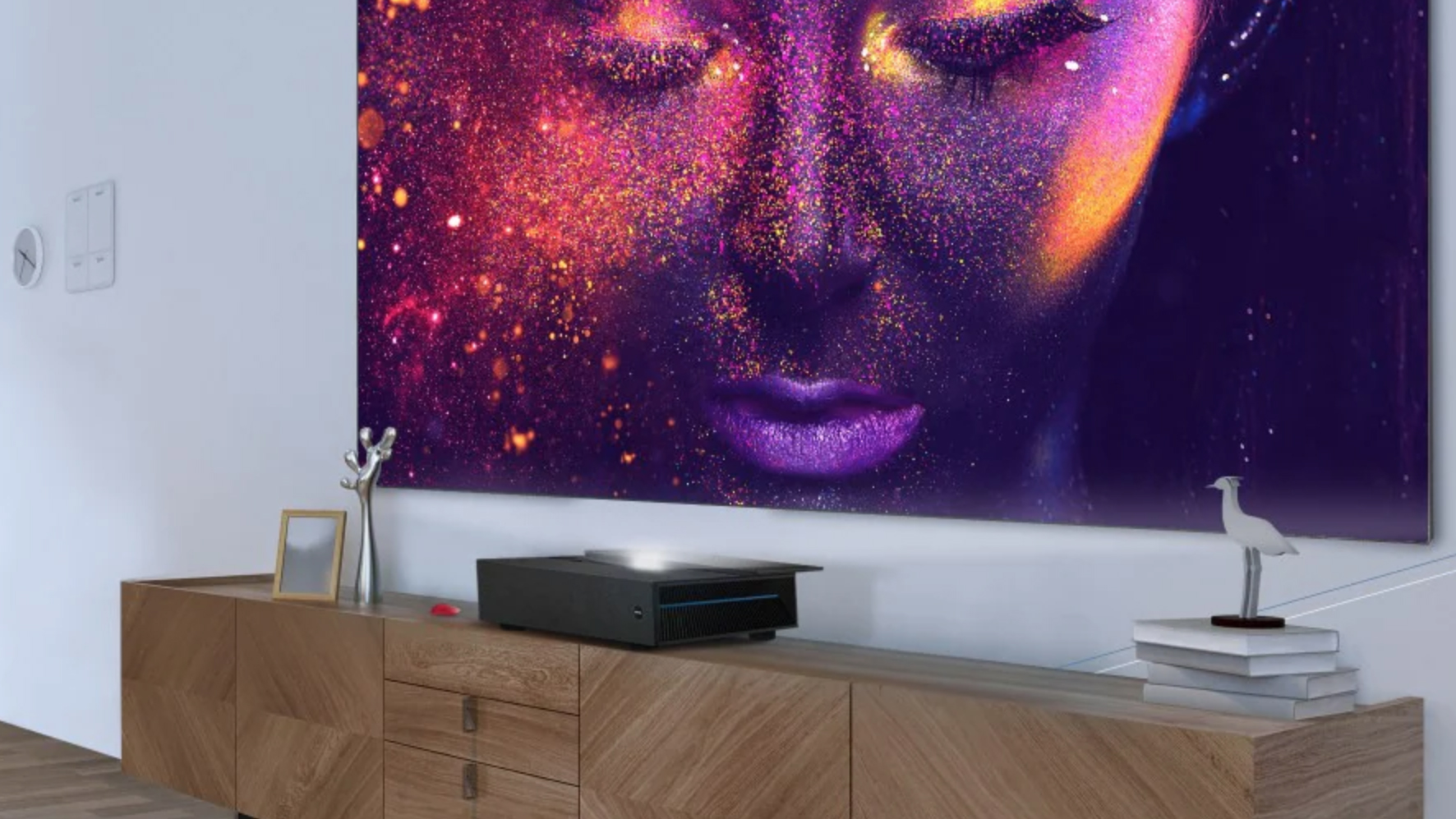
Sign up for breaking news, reviews, opinion, top tech deals, and more.
You are now subscribed
Your newsletter sign-up was successful
Do you need a projector? That’s a big question, and only you can work out the answer. But don’t worry, we’re here to help you.
Firstly, projectors are very different to TVs. Although that might sound obvious, not only are they different devices, they have different requirements. For example, a projector requires a darker room and a dedicated screen for the best results. You’ll also have to decide whether to opt for a stand or a ceiling mount. You don’t need to consider these things for a regular TV, but you will have to be sure about them before buying a projector.
But that doesn’t mean projectors are more hassle. There’s also no denying the impact of super-sized projected images, whether you’re catching up on your favourite movie, watching the big match or indulging in an immersive gaming session – everything looks better when it fills the entire wall.
There’s a range of projector brands to choose from – each releasing new models regularly. They all have line-ups that cover entry-level beamers through to high-end projector models for custom installations. You’ll also find some brands have competing projection technologies, with specs to meet every need and budget.
- Check out the best projectors available today
Although many tech brands make projectors, one of our favorites is BenQ. This projector manufacturer is one of the largest globally, offering an impressive range that stretches from entry-level units to dedicated home cinema models. BenQ also offers all of the latest display tech, from 1080p to 4K HDR. And the good news is new models are released regularly throughout the year.
If the thought of some big-screen action entices you, you’ll undoubtedly have seen a BenQ projector and thought, ‘should I buy it?’ or ‘is this brand for me?’. In this guide, you’ll find an introduction to the BenQ brand, an overview of what makes it stand out from the competition, as well as the latest deals on BenQ projectors – along with all our latest BenQ reviews too.
BenQ projectors: an overview
BenQ is a Taiwanese consumer electronics company that manufactures everything from laptops and monitors to digital cameras and projectors.
Sign up for breaking news, reviews, opinion, top tech deals, and more.
Today we’re interested in projectors, as the company has made a name for itself with the kind of data-grade projectors you often see in classrooms, boardrooms and bars. But that doesn’t mean it can’t also cater to living rooms, patios, and bedroom viewing.
BenQ’s projectors are based around Texas Instruments’ DLP (Digital Light Processing) display technology. This uses a chipset composed of millions of microscopic mirrors, which reflect the light from the bulb through the lens or away from it. As a result, each tiny mirror is either on or off, creating a black and white image.
A single-chip DLP projector adds color using a spinning wheel composed of red, green and blue segments, and this approach has both benefits and side effects. On the plus side, using a single chip results in a pin-sharp image, though the spinning color wheel can cause some people to see color fringing (rainbow) artefacts.
DLP projectors benefit from excellent motion handling and low latency, making them ideal for gamers. They also tend to be very bright, which is handy in rooms with white walls. However, they can be noisy, thanks to cooling fans and the color wheel whizzing around – their reflective nature results in poor black levels and limited shadow detail.
BenQ offers several DLP projectors that support 4K, but they don’t use a native 4K chipset. Instead, the more expensive 4K models employ a larger 2716 x 1528 pixel chip, with the image flashed twice to create the 4K image. Cheaper 4K beamers use a regular 1920 x 1080 chip and flash the image four times to produce the 4K picture.
The 4K capabilities of BenQ’s projectors are, however, slowly changing. As of May 2021, BenQ has released the TK700STi, a 4K HDR beamer able to natively output in 4K resolution – rather than upscale from HD.
Many of BenQ’s projectors also support HDR, but this is an area where potential buyers need to manage their expectations. No projector, regardless of the display technology it uses, can compete with a TV in terms of peak brightness. However, as long as the HDR image correctly tone maps to the projector’s abilities, the results can still be impressive.
For example, take a look at the BenQ V6050 projector, which offers a stylish alternative to large flatscreen TVs, thanks to an ultra-short-throw lens, laser light engine, and decent sound system.
You can use a projector as an alternative to a TV, but it’s worth remembering you’ll need sources and a sound system. A lamp-based projector will also take time to warm up and cool down, and the bulb will gradually dim and eventually need replacing. And no matter how bright the projector, it will always struggle when there’s ambient light in the room.
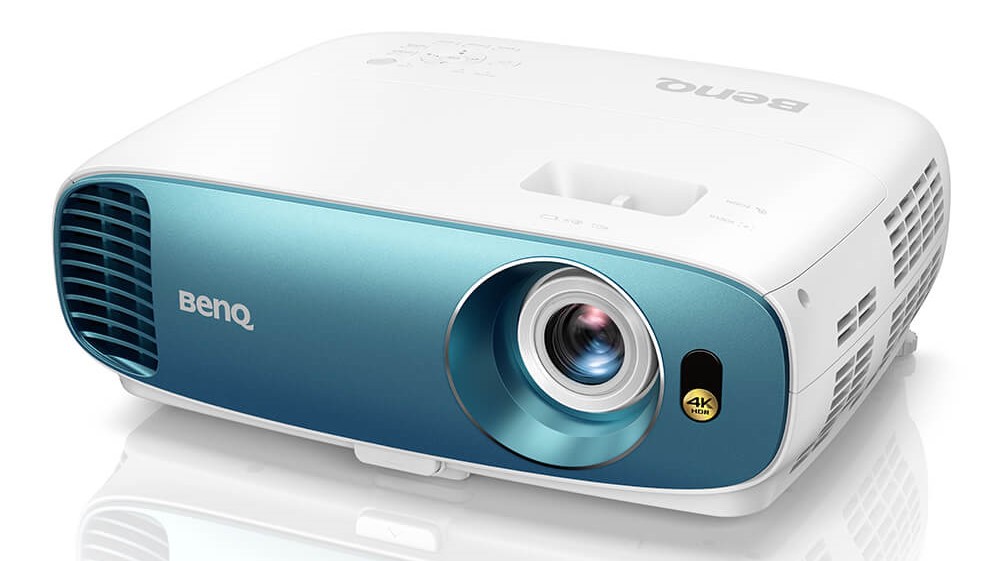
Should I buy a BenQ projector?
Now you understand how a BenQ projector works, why choose one of its models over another DLP competitor, like Optoma? The simple answer is economies of scale – an advantage that BenQ has leveraged to produce a range of competitively priced projectors to meet every requirement and pocket.
It’s often overlooked, but when it comes to big screen bang for your buck, nothing beats a projector. You can achieve screen sizes much bigger than even the largest TV panel, and for a fraction of the cost. BenQ offers numerous projectors that are not only very cheap, but easy to set up. Plug them in, point them at a wall, and you’re good to go.
BenQ might dominate the lower-end of the market with budget 1080p and 4K models where the emphasis is on big, bright and colorful images, but it hasn’t rested on its laurels. BenQ has also developed a range of home cinema models, which are not only more accurate, but can even deliver 100% of the DCI-P3 color gamut.
BenQ also offers projectors aimed squarely at sports fans and gamers, where the quick response times, smooth motion and low latency are perfect for fast-paced action. So whether it’s watching the big match, playing your favourite game, or catching-up on the latest 4K HDR movie, BenQ has you covered with its expansive range of projectors.
Of course, a BenQ projector won’t be for everyone, although their limitations are largely related to DLP itself. As already mentioned, there’s the possibility of ‘rainbows’, so make sure you don’t suffer from this particular issue before buying. If you do, you’re better off considering LCD projectors from Epson, which don’t use color wheels.
While a DLP projector is very easy to setup, it does have a restricted throw distance, and limited lens controls with no motorised memory features for different aspect ratios. Finally, if you want a genuinely native 4K projector, there isn’t much choice.
BenQ has recently launched the TK700STi, a 4K HDR beamer able to natively output in 4K resolution rather than upscale from HD, but it’s aimed at gamers. Instead, you could look at models from Sony and JVC, although these are significantly more expensive.
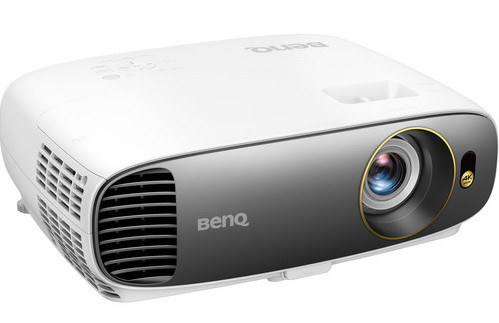
How much do BenQ projectors cost?
BenQ offers a few different projector ranges. There’s CinePro, CinePrime and CineHome. That’s what most people will need to know about. However, there are some other categories if you have more specific needs, such as gaming projectors, business projectors, portable projectors and large venue projectors. Essentially, no matter the size of your needs or your walls, BenQ has you covered.
The CineHome line-up is aimed at the more casual projector user, where the emphasis is on ease of setup, brightness and very low input lags. Prices ranging from the 1080p TW535 at just £499 (around £645 / AU$920), up to the 4K W1720 at $1,199 / £799 / AU$2,190.
The CinePrime and CinePro Series are designed for the home cinema fan, with a more sophisticated range of 1080p and 4HK HDR projectors, where the emphasis is on accuracy and wider color gamuts. These range from the 1080p W2000 at $1,199 / £899 / AU$1,499, to the high-end 4K HDR W5700 at £2,399 / AU$3,999 (around $2,330).
BenQ projector reviews
However, price and specifications only tell half the story. More importantly, how do these projectors perform, and what has TechRadar made of BenQ's latest models?
We've reviewed BenQ projectors in a number of price ranges – and you can check out our full thoughts with the links below:
BenQ V6050 projector
The BenQ V6050 offers a stylish alternative to large flatscreen TVs, thanks an ultra-short-throw lens, laser light engine, and decent sound system. Put this projector up against a white wall and you’re good to go, with stunning 4K images and HDR. There’s no built-in tuner or smart platform, but otherwise this beamer delivers impressive big screen bang for your buck.
BenQ X1300i 4K gaming projector
BenQ’s cuboid X1300i projector is aimed squarely at gamers, but it has the picture capabilities to make a great home projector for anyone watching TV shows and films, too. The smart platform has some blind spots – most notable the lack of Netflix – but overall the charms and capabilities of this projector make it well worth considering.
BenQ TH685 1080p projector
This super-responsive BenQ beamer is ideal for last-gen gamers who fancy some big screen immersion for a minimal outlay. An input lag of less than 10ms, and 3,500 lumens of brightness are sure to please, but those looking for 4K support will be disappointed.
BenQ HT3550 (W2700) 4K HDR projector
This 4K HDR BenQ projector delivers vivid and detailed big screen pictures at a competitive price. It’s a bit noisy and the limited brightness means you’ll need to pull the curtains, but otherwise this is a great choice for those seeking top notch image quality.
BenQ TK800 4K HDR projector
If you want big, sharp 4K HDR images but you’re on a budget, this is the BenQ for you. This projector has its limitations when it comes to black levels and shadow detail, but its bright, colorful and detailed images are hard to resist considering the price.
BenQ TK850 4K HDR projector
The BenQ TK850 is a stunning example of a 4K HDR projector with the brightness to do its picture justice. You’ll have to make do without many smart features but, if that’s not an issue, you should have little reason not to enjoy what the TK850 offers.
BenQ HT2550 (W1700) 4K HDR projector
This 4K HDR DLP projector from BenQ boasts all of the technology's strengths and weaknesses. Not only are the images bright, colorful and detailed, but they’re also very accurate, with only mediocre blacks, some fan noise and no lens shift to spoil the party.
BenQ W2000 1080p projector
This BenQ projector might be limited to 1080p, but not everyone has made the jump to 4K. So for those with big Blu-ray collections, this particular beamer may be the answer with its outstanding Rec.709 colors and impressive Full HD images.

Stephen is a freelance reviewer with over ten years experience writing for all the major tech publications. As a lifelong film fan he’s embraced the evolution of home entertainment over the decades, and as a professional audio and video calibrator he’s able to keep abreast of the latest developments and innovations. When not reviewing the latest products, Stephen can be found obsessing over how to cram a bigger screen and more speakers into his own home cinema.
